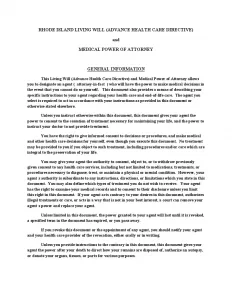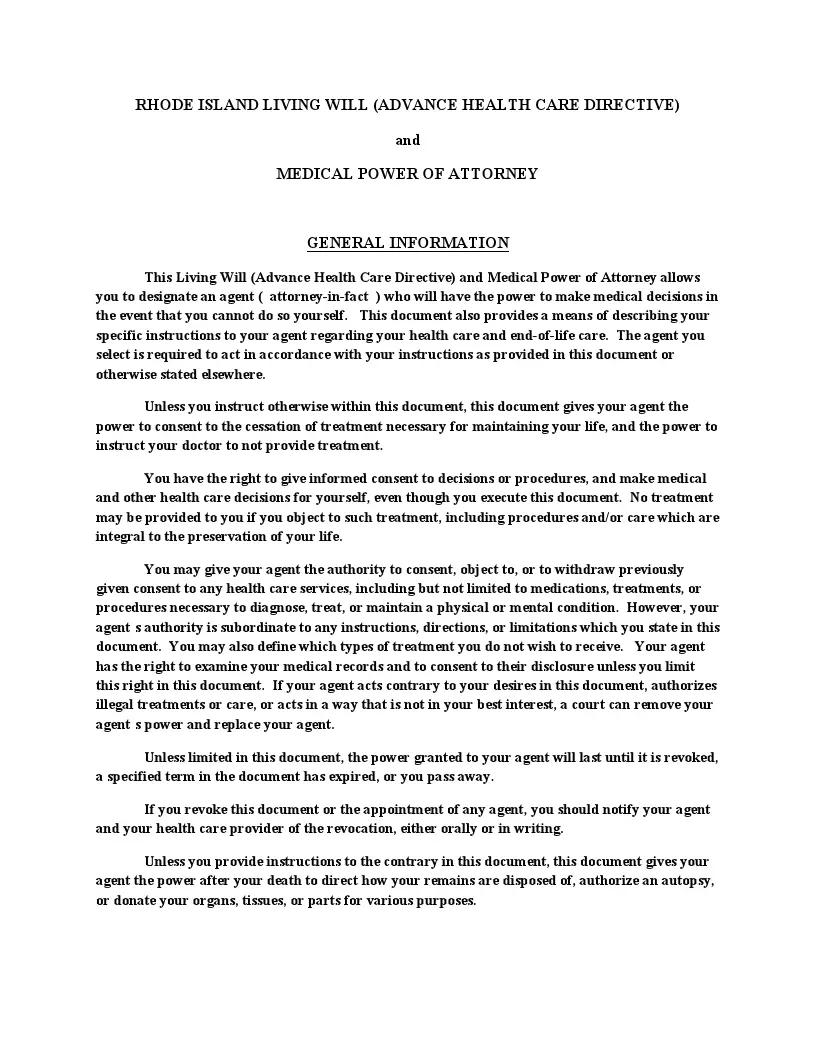Free Rhode Island Living Will Form
A Rhode Island living will, also known as an “advance directive,” outlines an individual’s preferences for medical care, particularly end-of-life care, such as life support and resuscitation efforts. It is used when a person is terminally ill, permanently unconscious, or otherwise unable to make decisions about their medical treatment.
A living will form includes decisions about using life-sustaining treatments, such as mechanical ventilation, artificial nutrition and hydration, and other medical interventions. The document is executed with a durable power of attorney for health care, which appoints another person (a healthcare proxy) to make medical decisions on the declarant’s behalf.
Healthcare providers in Rhode Island are legally bound to follow the instructions in a living will as long as it complies with state laws. If there is a conflict between the patient’s appointed health care proxy and the living will, the instructions in the living will generally take precedence unless the power of attorney document specifies otherwise.
Signing Requirements and Laws
The signing of a living will in Rhode Island is detailed under § 23-4.11-3 of the Rhode Island General Laws. According to the law, the declarant must sign the living will. Another individual in the declarant’s presence can also sign the document at the declarant’s direction if the declarant is physically unable to sign. This signing must occur in the presence of two competent witnesses who meet specific criteria:
- The witnesses must be at least eighteen years old.
- They should not be related to the declarant by blood or marriage.
- They cannot be entitled to any portion of the declarant’s estate upon death under any will or by operation of law.
- The witnesses should not be financially responsible for the declarant’s medical care.
These witnesses must also sign the document, attesting that they have observed the declarant’s signing or acknowledgment of the signature and that the declarant appears to be of sound mind and under no duress or undue influence at the time of signing.
The legal framework for living wills in Rhode Island is further supported by § 23-4.11-2, which provides the definitions and general provisions, and § 23-4.11-3, which describes the conditions under which the living will becomes effective. Specifically, a living will in Rhode Island takes effect when it is delivered to the attending physician and the declarant is determined to be in a terminal condition.
Rhode Island Living Will Form Details
| Document Name | Rhode Island Living Will Form |
| State Form Name | Rhode Island Advance Directive |
| Signing Requirements | Two Witnesses |
| Validity Requirements | § 23-4.11-3 |
| State Laws: Rhode Island General Laws, Sections 23-4.11-1 to 23-4.11-15 | |

Steps to Fill Out the Form
Below is a detailed guide to help you complete the Rhode Island living will form. Review the document periodically and consider updates if your health circumstances or preferences change. If you make any changes, follow the same steps for witnessing and distributing the new copies.
1. Enter Your Personal Information
To identify yourself as the declarant, begin by filling in your full name at the start of the declaration. Make sure to write clearly and accurately to avoid any potential confusion.
2. Specify Your Wishes for Medical Treatment
In the main body of the form, outline your specific desires regarding medical treatment in situations where you are unable to make decisions and are facing a terminal condition. This part includes specifying whether you wish to withhold or withdraw life-prolonging treatments that do not contribute to your comfort or alleviate pain.
3. Make Decisions Regarding Artificial Nutrition
Decide whether you want to include or exclude artificial nutrition and hydration as part of your end-of-life care. Check the appropriate box to indicate your decision clearly.
4. Sign and Date the Form
Sign the form in the designated area to legally validate the declaration. Ensure you do this in the presence of witnesses. Date the form by filling in the day, month, and year to document when the declaration was made.
5. Add Witness Information
The form requires two witnesses to sign and verify that they know you and that you signed the document voluntarily in their presence. Each witness must provide their signature, printed name, and address.
6. Provide Your Address
Enter your complete address in the specified area to validate the form further and confirm your residency.
7. Keep Copies in Accessible Locations
Once completed, keep the original document in a safe but accessible place and provide copies to your primary care physician, health care proxy, and any other relevant parties. This ensures that your healthcare preferences are known and can be accessed when needed.

Below are various other Rhode Island templates completed by our users. Try our simple builder to customize these forms to your preferences.
Other Living Will Forms by State
